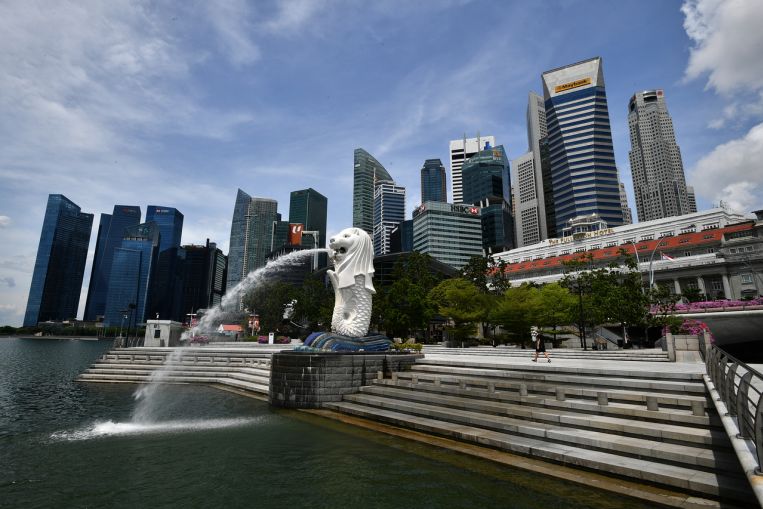SINGAPORE – Singapore’s financial sector outperformed the overall economy in 2020 by growing at a pace that was even faster than the year before, the central bank’s annual report showed.
Tharman Shanmugaratnam, chairman of the Monetary Authority of Singapore, said financial services grew by 5.1 per cent last year, supported by broad-based growth across banking, insurance, fund management, and payment services. This outstripped the sector’s growth of 4.1 per cent in 2019.
In his annual message, Senior Minister Tharman said the sector along with the fintech industry also created a net 2,500 jobs, which were taken up by locals.
Fintech investments into Singapore also posted a strong 34 per cent growth last year to reach a record $1.4 billion, as reported by the Boston Consulting Group.
The robust performance was achieved in a year when the Covid-19 pandemic pulled the overall economy down by 5.4 per cent into its worst recession since independence and the unemployment rate rose to 3 per cent, the highest in more than a decade.
“The banking system entered the crisis from a position of strength. We expect domestic systemically important banks to remain resilient and well positioned to provide a smooth supply of credit to the economy,” the senior minister said.
He said the financial sector met both the value-added and jobs growth targets in the 5-year Industry Transformation Map (ITM) for 2016-2020.
Together with the Institute of Banking and Finance – which was appointed Jobs Development Partner for Financial Services by the National Jobs Council – MAS has sharpened its ability to identify employment patterns amongst financial institutions and to proactively engage them on upskilling and re-skilling their workforce as well as to help Singaporeans enter the industry, he noted.
Highlighting the central bank’s efforts to mitigate the economic impact of the pandemic, Mr Tharman said MAS aimed at maintaining monetary and financial stability and supporting individuals, businesses and financial institutions to manage the challenges.
The introduction of the MAS SGD Term Facility and MAS USD Facility helped in managing the stronger demand for SGD and USD liquidity, while collaboration with the financial industry to introduce credit and insurance support measures aided individuals and small and medium-sized enterprises (SMEs) to manage their financial commitments.
MAS also provided low-cost Singapore dollar funding at 0.1 per cent to support lending by banks and finance companies to SMEs.
Enhanced training support schemes were introduced to upskill Singaporeans for new jobs in the financial sector, as well as measures to position financial institutions and FinTech firms for stronger growth, Mr Tharman said.
Despite the disruption caused by the pandemic, MAS moved ahead with its longer-term goals for the financial sector, particularly in digital transformation.
In 2020, MAS awarded digital banking licences to four successful applicants – a consortium of Grab and Singtel, an entity wholly-owned by Sea Ltd, a consortium of Greenland Financial Holdings, Linklogis Hong Kong, and Beijing Co-operative Equity Investment Fund Management, and an entity wholly-owned by Ant Group.
Together with industry and government partners, MAS also launched the Singapore Financial Data Exchange (SGFinDex), a digital finance infrastructure which allows Singaporeans to consolidate their financial information for more effective financial planning.
Despite the challenges of Covid-19, the 2020 Singapore FinTech Festival (SFF) x Singapore Week of Innovation and Technology (SWITCH) attracted strong participation globally, with more than 3.5 million session views clocked on the online event platform and social media.
The Payment Services Act was amended to combat the misuse of digital payment tokens for money laundering and terrorism financing, and to allow MAS to impose measures on digital payment tokens service providers for consumer protection.
MAS implemented initiatives to bolster the financial literacy among the public and to create awareness of the risks involved in dealing with cryptocurrencies.
In a move to facilitate Asia’s transition to a low carbon future and support a sustainable Singapore, the central bank issued its first Sustainability Report earlier in June.
As a financial regulator and supervisor, MAS has also issued guidelines on environmental risk management for banks, insurers and asset managers.
MAS is actively involved in the International Organization of Securities Commissions (IOSCO) Sustainable Finance Task Force, and is co-leading work contributing towards the development of a globally applicable sustainability reporting standard.
MAS is also building a climate-resilient investment portfolio and implementing portfolio actions to both mitigate climate risks and capture opportunities from a low-carbon transition.
In addition, MAS is working actively with the industry to develop innovative green finance products and FinTech solutions that can mobilise private capital to finance green and sustainable projects in Singapore and the region.
Mr Tharman said that even as Covid-19 persists, the global economy should continue to improve over the rest of 2021, supporting Singapore’s export-oriented sectors.
“The domestic-facing industries are expected to recover more gradually, on the back of macroeconomic policy stimulus, progressive re-opening of the economy, and the sustained roll-out of vaccinations,” he said.
To maintain macroeconomic, financial and price stability, MAS has maintained an accommodative monetary policy by keeping the exchange rate policy band for the trade weighted Singapore dollar on a stable, zero per cent appreciation path.













































